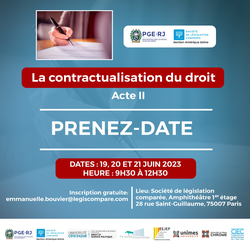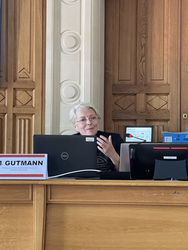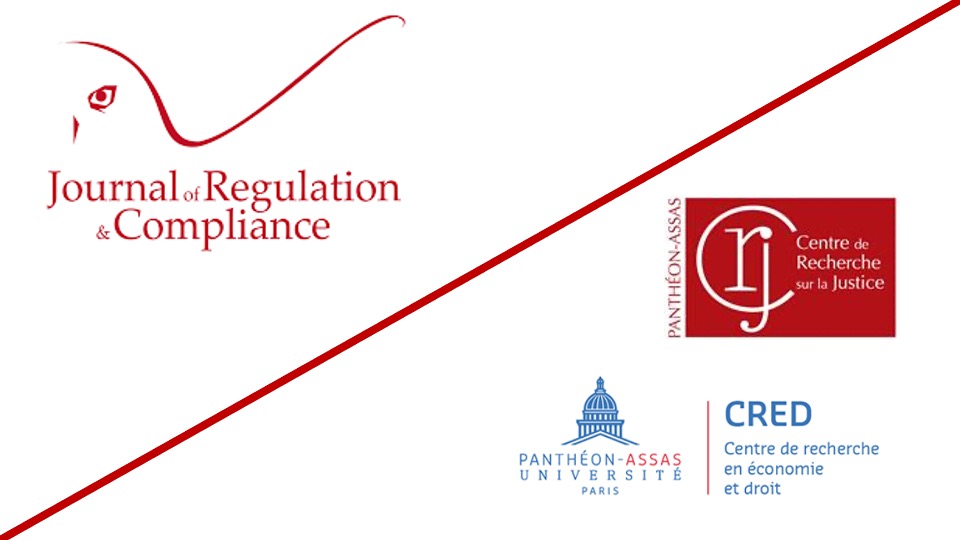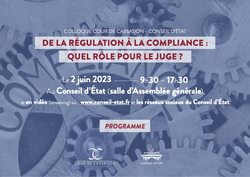Food for thoughts
Nov. 9, 2023
Publications

🌐follow Marie-Anne Frison-Roche on LinkedIn
🌐subscribe to the Newsletter MAFR Regulation, Compliance, Law
____
► Full Reference: M.-A. Frison-Roche, "Reinforce the Judge and the Lawyer to impose Compliance Law as a characteristic of the Rule of Law", in M.-A. Frison-Roche (ed.), Compliance Jurisdictionalisation, Journal of Regulation & Compliance (JoRC) and Bruylant, "Compliance & Regulation" Serie, 2024, pp. 39-65
____
📝read the article
____
🚧read the bilingual Working Paper which is the basis of this article, with additional developments, technical references and hyperlinks
____
📘read a general presentation of the book, Compliance Jurisdictionalisation, in which this article is published
____
► This article is the introduction of the book.
► Summary of the article (done by the Journal of Regulation & Compliance): One can understand that the compliance mechanisms are presented with hostility because they seem designed to keep the judge away, whereas there is no Rule of Law without a judge. Solid arguments present compliance techniques as converging towards the uselessness of the judge (I). Certainly, we come across magistrates, and of all kinds, and powerful ones, but that would be a sign of imperfection: its ex-ante logic has been deployed in all its effectiveness, the judge would no longer be required... And the lawyer would disappear so with him...
This perspective of a world without a judge, without a lawyer and ultimately without Law, where algorithms could organize through multiple processes in Ex Ante the obedience of everyone, the "conformity" of all our behaviors with all the regulatory mass that is applicable to us, supposes that this new branch of Law would be defined as the concentration of processes which gives full effectiveness to all the rules, regardless of their content. But supposing that this engineer's dream is even achievable, it is not possible in a democratic and free world to do without judges and lawyers.
Therefore, it is imperative to recognize their contributions to Compliance Law, related and invaluable contributions (II).
First of all, because a pure Ex Ante never existed and even in the time of the Chinese legists📎!footnote-2689, people were still needed to interpret the regulations because a legal order must always be interpreted Ex Post by who must in any case answer the questions posed by the subjects of law, as soon as the political system admits to attributing to them the right to make claims before the Judge. Secondly the Attorney, whose office, although articulated with the Judge's office, is distinct from the latter, both more restricted and broader since he must appear in all cases where the judicial figure puts himself in square, outside the courts. However, Compliance Law has multiplied this since not only, extending Regulatory Law, it entrusts numerous powers to the administrative authorities, but it also transforms companies into judges, in respect of which the attorneys must deal with.
Even more so, Compliance Law only takes its sense from its Monumental Goals📎!footnote-2690. It is in this that this branch of the Law preserves the freedom of human beings, in the digital space where the techniques of compliance protect them from the power of companies by the way that the Compliance Law forces these companies to use their power to protect people. However, firstly, it is the Judges who, in their diversity📎!footnote-2691, impose as a reference the protection of human beings, either as a limit to the power of compliance tools📎!footnote-2692 or as their very purpose. Secondly, the Attorney, again distinguishing himself from the Judge, if necessary, reminds us that all the parties whose interests are involved must be taken into consideration. In an ever more flexible, soft and dialogical Law, everyone presenting himself as the "advocate" of such and such a monumental goal: the Attorney is legitimate to be the first to occupy this place.
________
Nov. 9, 2023
Thesaurus : 05. CJCE - CJUE
► Référence complète : CJUE, deuxième chambre, 9 novembre 2023, aff. C-376/22, Google Ireland
____
________
Oct. 18, 2023
Thesaurus : 02. Cour de cassation
► Référence complète : Cour de cassation, Première Chambre civile, 18 octobre 2023, n°22-18.926, e-Enfance et La Voix de l'enfant
____
____
📧lire l'article de la Newsletter MAFR Regulation, Compliance, Law sur le sujet : ""
____
► Résumé de l'arrêt :
_______
Oct. 18, 2023
Thesaurus : 02. Cour de cassation
Oct. 4, 2023
Conferences

🌐follow Marie-Anne Frison-Roche on LinkedIn
🌐subscribe to the Newsletter MAFR Regulation, Compliance, Law
____
 ► Full Reference: M.-A. Frison-Roche, "L'avenir du Droit de la compliance" (The futur of Compliance Law), in Cour de cassation (French Court of cassation), La Nuit du Droit 2023, October 4, 2023.
► Full Reference: M.-A. Frison-Roche, "L'avenir du Droit de la compliance" (The futur of Compliance Law), in Cour de cassation (French Court of cassation), La Nuit du Droit 2023, October 4, 2023.
____
🎥 Watch the video (in French)
____
🧮read the full programme of this event
The Cour de cassation (French Court of cassation) had presented 4 successive themes insofar as they affect the future of Law: filiation, artificial intelligence, the environment and compliance.
The President of the Chambre sociale de la Cour de cassation (Social Chamber of the Court of Cassation) gave a presentation on Compliance and the essential role played by the Judge. Then, the Parquet général (Prosecutor General's Office) then asked Fabien Raynaud, Conseiller d'État, about the importance of 'systemic cases' in Compliance Law and the dialogue between judges that it implies, using the Youporn case currently being examined by the judges.
____
► General presentation of the speech: As my work has been seminal for Compliance Law, I was asked about the future of Compliance Law.
________
Sept. 28, 2023
Thesaurus : 01. Conseil constitutionnel
► Référence complète : Conseil constitutionnel, 28 septembre 2023, n° 2023-1062 QPC
____
________
Sept. 28, 2023
Thesaurus : Doctrine
► Référence complète : V. Magnier, "Devoir de vigilance et risques climatiques", in F. Barrière et M. Zolomian (dir.), Le droit des sociétés saisi par le climat, JCP E, n° 39, 28 septembre 2023, pp.18-21.
____
► Résumé de l'article (fait par l'auteure) : "L’introduction des outils de la compliance en droit des sociétés crée une approche juridique binaire : l’une préventive, l’autre de contrôle et de responsabilité. Alors que la loi sur le devoir de vigilance adopte cette double approche, l’analyse révèle qu’en dépit de l’encadrement d’un dispositif préventif ambitieux, la loi sur le devoir de vigilance peine sur le second volet, les contrôle et responsabilité restant lacunaires.".
____
🦉Cet article est accessible en texte intégral pour les personnes inscrites aux enseignements de la Professeure Marie-Anne Frison-Roche
_________
Sept. 27, 2023
Thesaurus : 02. Cour de cassation
Sept. 21, 2023
Thesaurus : Doctrine
► Référence complète : G. Poissonnier, "CJIP avec Technip: peut-on garder les mains propres dans le pétrole ?", JCP E, n° 38, septembre 2023, étude 1267, pp. 52-53
____
► Résumé de l'article (fait par l'auteur) : "Solution. - Une convention judiciaire d’intérêt public (CJIP) conclue par le parquet national financier et la société Technip prévoit le paiement au Trésor public d’une amende de près de 209 millions d’euros pour des faits de corruption d’agents publics étrangers.
Impact. - L’amende prononcée est substantielle mais la CJIP conclue récompense la bonne foi de l’entreprise qui a dénoncé des faits de corruption et a pleinement coopéré avec les autorités judiciaires. La question de la nature de la suite pénale qui sera donnée en cas de réitération de l’infraction est posée."
____
🦉Cet article est accessible en texte intégral pour les personnes inscrites aux enseignements de la Professeure Marie-Anne Frison-Roche
________

Sept. 5, 2023
Publications

🌐follow Marie-Anne Frison-Roche on LinkedIn
🌐subscribe to the Newsletter MAFR Regulation, Compliance, Law
____
 ► Full Reference: M.-A. Frison-Roche, Moving through Time to align Compliance with the rights of the defence, Working Paper, September 2023.
► Full Reference: M.-A. Frison-Roche, Moving through Time to align Compliance with the rights of the defence, Working Paper, September 2023.
____
📕This working paper has been drawn up as the second part of the book Compliance et droits de la défense (Compliance and the rights of the defence), a first section summarising this book.
____
📝This Working Paper was drawn up to serve as a basis for this second section, which sets out the general way in which the rights of the defence and the compliance system can be articulated, thank to this movement of moving back in time.
____
► Summary of this Working Paper: The subject of Compliance & rights of the defence is difficult to pin down because it often gives rise to totally opposing presentations, which express the initial confrontation between Compliance and rights of the defence, which seems irreducible. This initial confrontation must be acknowledged, and this is even more necessary to prevent it from becoming definitive(I)
But in a society governed by the Rule of Law, the rights of the defence are central, and the hierarchy of norms dictates that they remain the privilege of all those who risk being punished in the future. Admittedly, if we look at the course of events in a linear way, the Compliance mechanisms come in Ex Ante, whereas the rights of the defence would only be activated when the repressive procedures would later come to bear on the moral or natural person. The question would therefore not even arise, or not in a central way. But this reasoning creates a false compatibility between Compliance and the rights of the defence (II.
Indeed, it is the perspective of punishment in the future that forms the basis for the attribution of rights of the defence in the present. This consideration of the future not only allows but obliges the Law to "move in time", to always think in advance about what might happen tomorrow: this is how we must think about the Compliance methods of Internal Investigation, the DPA (or in the French legal system the Convention judiciaire d'intérêt public and the French Guilty plea procedure (CRPC) (III). As soon as these Compliance Tools are being used in practice, at the time they are being used, we must already think about how their results will be used, results which they have often been used for, because the Internal Investigation is a formidable piece of Evidence for obtaining a conviction and/or a DPA, etc. : therefore, the rights of the defence must shift over time, from the future to the present of the Information collect.
Two ambiguities that affect Compliance Law itself, ambiguities which the rights of the defence help to clarify, now appear more clearly. The first concerns the place occupied by the consent of the person who could have been protected by the rights of defence but //who exercises his/her will to renounce them (IV). Consent, in relation to the will of which it is the expression, is also linked with the future and allows Compliance once again to take precedence over the prerogatives of the individual who chooses not to benefit from it. The omnipresence of 'consent' in Compliance is enlightening here... The second ambiguity concerns the place of secrecy (V). Secrecy seems to be the prerogative of the rights of the defence. But it can also be an effective Compliance Tool when Confidentiality enables the company to detect and prevent breaches. It may even constitute the very Monumental Goal of Compliance Law. This happens when the Goal of Compliance Law, in which legal normativity is placed, becomes the protection of the individual, as is the case for personal information. That guides the European Judge, in line with the humanism that underpins European Compliance Law, in finding the right balance, this protection and effectiveness, depending on whether the information must be given or must be not.
____
🔓read the Working Paper developments below ⤵️
July 24, 2023
Thesaurus : Juridictions étrangères diverses
► Référence complète : High Court of Justice (Haute Cour de Londres), 24 juillet 2023, aff. n° BL-2023-000215, [2023] EWHC 1897 (Ch), ClientHearth c/ Shell PLC
____
____
🏛️lire le jugement du 25 mai 2023 rendu dans la même affaire et que la présente décision confirme
________
July 15, 2023
Newsletter MAFR - Law, Compliance, Regulation

🌐suivre Marie-Anne Frison-Roche sur LinkedIn
🌐s'abonner à la Newsletter MAFR Regulation, Compliance, Law
____
► Référence complète : M.-A. Frison-Roche, "Compliance & Contrat / lien entre Consentement et Volonté ; enjeu de responsabilité personnelle : CNIL, 15 juin 2023, Criteo", Newsletter MAFR Law, Compliance, Regulation, 15 juillet 2023.
____
📧Lire par abonnement gratuit d'autres news de la Newsletter MAFR - Law, Compliance, Regulation
____
🧱L'obligation légale de Compliance doit être exécutée grâce à des contrats, mais l'on ne peut s'en décharger par des contrats : CNIL, 15 juin 2023, Criteo
____
📧lire l'article ⤵️
July 8, 2023
Newsletter MAFR - Law, Compliance, Regulation

♾️suivre Marie-Anne Frison-Roche sur LinkedIn
♾️s'abonner à la Newsletter MAFR Regulation, Compliance, Law
____
► Référence complète : M.-A. Frison-Roche, "Présent et avenir des "causes systémiques" : cas des sites pornos (jugement 7 juillet 2023)", Newsletter MAFR Law, Compliance, Regulation, 8 juillet 2023.
____
📧Lire par abonnement gratuit d'autres news de la Newsletter MAFR - Law, Compliance, Regulation
____
🧱Consécration de la notion proposée de "cause systémique" dans les contentieux de Droit de la compliance : jugement du Tribunal judiciaire de Paris du 7 juillet 2023, "Youporn" (Arcom c/ Orange et autres)
Ce jugement remet de l'ordre et sursoit à statuer pour permettre au Conseil d'État de statuer sur ce qui est la même question impliquant le système numérique, les obligations des plateformes, la technologie. L'office du juge est en pleine transformation lorsque la Compliance est impliquée et que les systèmes eux-mêmes sont en jeu.
____
📧lire l'article ⤵️
July 6, 2023
Thesaurus : 08. Juridictions du fond
► Référence complète : TJ Paris, 5ème chambre, 2ème section, ordonnance du juge de la mise en état, 6 juillet 2023, n° RG 22/03403, TotalÉnergies
____
____
📝commentaires de la décision :
- Dalloz actualité, 13 juillet 2023, obs. J.-B. Barbièri & A. Touzain
- Rev. sociétés, 2023, p.793, obs. A. Danis-Fatôme & N. Hoffschir
- Gaz. pal., 19 septembre 2023, n° 29, n°GPL453l6, pp. 2-3, note V. Mazeaud
- Bull. Joly, novembre 2023, n° BJS202m8, pp. 17-19, note E. Schlumberger
________
July 5, 2023
Interviews

♾️follow Marie-Anne Frison-Roche on LinkedIn
♾️subscribe to the Newsletter MAFR Regulation, Compliance, Law
____
► Full Reference: M.-A. Frison-Roche et A. Seban, "Compliance : les cours suprêmes s’emparent de la question de ses enjeux juridictionnels" ("Compliance : the Supreme Courts take up the issue of its jurisdictional implications"), interview with Olivia Dufour, Actu-Juridique, 5 July 2023.
____
💬read the interview (in French)
____
► Presentation of the interview by the journal (in French): "Le 2 juin dernier s’est tenu au Conseil d’État un colloque fondateur sur le rôle du juge dans la compliance. Le professeur Marie-Anne Frison-Roche et le conseiller d’État Alain Seban, qui ont tout deux contribué aux débats, ont accepté de commenter les principaux enseignements des travaux de cette journée."
____
► Questions asked (in French):
- Le colloque « De la régulation à la compliance, quel rôle pour les juges » qui s’est tenu au Conseil d’État le 2 juin dernier a rassemblé juges civils et administratifs. En quoi le juge administratif est-il concerné par la compliance qui semble plutôt une affaire d’entreprises et donc de justice civile et commerciale ?
- Vincent Vigneau, président de la chambre commerciale de la Cour de cassation rappelle que la compliance a plutôt vocation à éviter le juge en se situant ex ante, pourtant on découvre que le juge lui-même accepte de plus en plus de se prononcer en ex ante… qu’en est-il ?
- Quel peut donc être le rôle du juge dans la compliance ? Peut-il contribuer à faire émerger un droit de la compliance et à l’harmoniser ?
- François Ancel semble considérer que le rôle juge va devoir adapter son office à la compliance, il évoque trois concepts : téléologique, soutenabilité et efficacité…
- Le juge dispose-t-il en l’état de tous les outils nécessaires ? Si tel n’est pas le cas, que faut-il créer ?
- En quoi le dialogue des juges, civil/administratif, national/européen, national/international, est-il important ?
- Que veut dire F. Ancel quand il déclare que le juge doit évoluer du constat à la trajectoire ?
- Existe-t-il des domaines où la compliance entre en conflit avec des principes processuels, par exemple le principe de légalité des peines ?
- En quoi la notion de « buts monumentaux », que vous avez créée en 2016, a-t-elle trouvé sa place dans le droit ?
________
July 3, 2023
Newsletter MAFR - Law, Compliance, Regulation

♾️suivre Marie-Anne Frison-Roche sur LinkedIn
♾️s'abonner à la Newsletter MAFR Regulation, Compliance, Law
____
► Référence complète : M.-A. Frison-Roche, "Compliance. CJIP : le calcul de l'amende d'intérêt public / CJIP, Vercel (Lactalis), 30 mars 2023", Newsletter MAFR Law, Compliance, Regulation, 3 juillet 2023.
____
📧Lire par abonnement gratuit d'autres news de la Newsletter MAFR - Law, Compliance, Regulation
____
🧱 Si l'entreprise n'a pas directement gagné d'argent, quel peut être le montant de l'amende d'intérêt public fixé par une CJIP ? Analyse de la CJIP du 30 mars 2023 Groupe Lactalis, validée par l'ordonnance du Président du Tribunal de Besançon du 1ier juin 2023.
____
📧lire l'article ⤵️
June 28, 2023
Newsletter MAFR - Law, Compliance, Regulation

♾️suivre Marie-Anne Frison-Roche sur LinkedIn
♾️s'abonner à la Newsletter MAFR Regulation, Compliance, Law
____
► Référence complète : M.-A. Frison-Roche, "S'engager n'est pas contracter (décision du Conseil d'État du 21 avril 2023, Orange c/ Arcep)", Newsletter MAFR Law, Compliance, Regulation, 28 juin 2023.
____
📧Lire par abonnement gratuit d'autres news de la Newsletter MAFR - Law, Compliance, Regulation
____
🔴Engagements, acceptation, convention : multiplication de ces actes de volonté acceptés qui ne sont pourtant pas des contrats et échappent à leurs principes
Dans sa décision du 21 avril 2023, société Orangec/ Arcep, le Conseil d'État dit ce que ne constitue pas les engagements souscrits par l'opérateurs pour le déploiement de la fibre, acceptés par le ministre : ce n'est pas un contrat. La "qualification négative" est donc donnée. Mais alors qu'est-ce que c'est ?
____
📧lire l'article ⤵️
June 22, 2023
Thesaurus : 05. CJCE - CJUE
► Full Reference: CJUE, 1st Chamber, 22 June 2023, C-579/21, Pankki S.
____
________

June 21, 2023
Publications

♾️follow Marie-Anne Frison-Roche on LinkedIn
♾️subscribe to the Newsletter MAFR Regulation, Compliance, Law
____
► Full Reference: M.-A. Frison-Roche, Conditions required to promote the "contractualisation" of the Law, Working Paper, June 2023.
____
🎤This Working Paper has been done as a basis for the closing conference of the colloquia La contractualisation du droit. Acte II, organised by the Société de législation comparée (SLC) and the Procuradoria Geral do Estado do Rio de Janeiro (PGE-RJ), on 19, 20 and 21 June 2023.
____
📝It is also the basis of the article "Les conditions requises pour favoriser la "contractualisation" du droit" ("Conditions required to promote the "contractualisation" of Law"), published in the book 📗La contractualisation du droit. Approches françaises et brésiliennes (Contractualisation of Law. French and Brazilian approaches).
____
► English Summary of the Working Paper :
____
🔓read the Working Paper⤵️
June 21, 2023
Conferences

♾️follow Marie-Anne Frison-Roche on LinkedIn
♾️subscribe to the Newsletter MAFR Regulation, Compliance, Law
____
► Full Reference: M.-A. Frison-Roche, "Favoriser ou pas la « contractualisation » du Droit" ("To favour or not the "contractualisation" of the Law"), final speech in Société de législation comparée (SLC) and Procuradoria Geral do Estado do Rio de Janeiro (PGE-RJ), La contractualisation du droit. Acte II, Paris, 21 June 2023.
____
🧮See the full programme of this event (in French).
The conference is held in French
________
June 14, 2023
Conferences

♾️follow Marie-Anne Frison-Roche on LinkedIn
♾️subscribe to the Newsletter MAFR Regulation, Compliance, Law
____
► Full Reference: M.-A. Frison-Roche, "Compliance et droit processuel" ("Compliance and Procedural Law"), in B. Deffains, M.-A. Frison-Roche and J.-B. Racine (dir.), Journal of Regulation & Compliance (JoRC) and University Panthéon-Assas (Paris II), Compliance : Obligation, devoir, pouvoir, culture (Compliance : obligation, duty, power, culture), University Panthéon-Assas, Salle des Conseils, 14 June 2023.
____
🧮See the full programme of this event

____
🎤see the other speech made during the first day of this symposium : "L'obligation de compliance, entre volonté et consentement : obligation sur obligation vaut" ("Compliance Obligation, between will and consent: obligation on obligation works")
____
► Summary of the conference: After referring to the chapter in the book Compliance Jurisdictionalisation, which deals more specifically with Procedural Law
The first development relates to the fact that the relationship between Compliance Law and Procedural Law is very difficult because it is often said that they simply have nothing to do with each other, or that they have everything to dislike each other. This is because Compliance is often reduced to processes, and to the mechanical place that algorithms could take in it, in taking care of everything.
Compliance would even have the purpose and effect of ensuring that the company and its managers never come into contact with a judge, the public prosecutor being their best ally in this respect.
Secondly, I recalled the very common idea that Procedural Law is a kind of 'tribute' that the rule of Law demands, which certainly weighs down companies when compared with companies living in systems in which there's not not such a price.
But many stress that Procedural Law could become a model. This can be justified and technically anticipated because it has already happened in Regulation Law, and Compliance Law is the deployment of it
In the third stage, I worked on the alliance between the two, with the procedure (rather than the process) modifying compliance and thereby reinforcing it, evoking the way in which this can manifest itself technically
In the fourth step, I looked for what would be the "naturally appropriate procedure" for Compliance: one that takes into account the duration and the development of "solutions", to which the notion of "sustainability", which is central in the substantive Law of Compliance, refers.
In a fifth stage, and devoting more time to this, I have pointed out where innovation should be the strongest: the proof, the probatory obligation being the "part totale" ("total part") of the compliance obligation. This major issue will be the subject of a series of symposiums held in 2024.
________
See the articles that are part of the Second chapter of the book 🕴️M.-A. Frison-Roche (ed.), 📘Compliance jurisdictionalisation, 2023 :
- 🕴️N. Cayrol, 📝General Procedural Law in Compliance Law,
- 🕴️F. Ancel, 📝The procedural principle of compliance, a new trial leading principle?,
- 🕴️B. Sillaman, 📝Privilege and Cooperation: Procedural Lessons Learned from the U.S. for Global Application,
- 🕴️A. Linden, 📝Motivation and publicity of the decisions of the restricted committee of the French Personal Data Protection Commission (Commission nationale de l'informatique et des libertés-CNIL) in a compliance perspective,
- 🕴️S. Scemla and 🕴️D. Paillot, 📝The supervisory Authorities face difficulties to apprehend the Rights of the Defense,
- 🕴️M.-A. Frison-Roche, 📝Adjusting by the nature of things General Procedural Law to Compliance Law.
🕴️M.-A. Frison-Roche, 🚧From Regulation Law to Compliance Law, 2017.
🕴️M.-A. Frison-Roche, 🎤Le rôle du Juge dans le déploiement du Droit de la Régulation en Droit de la Compliance (The role of the Judge in the deployment of Regulatory Law in Compliance Law), in 🧮De la Régulation à la Compliance : quel rôle pour le Juge ?, 2023.
Notably in this perspective, 🕴️M.-A. Frison-Roche and 🕴️M. Boissavy, 📕Compliance et droits de la défense. Enquête interne - CJIP - CRPC (Compliance and Due Process. Internal Investigation - DPA), 2024.
June 2, 2023
Conferences

🌐follow Marie-Anne Frison-Roche on LinkedIn
🌐subscribe to the Newsletter MAFR Regulation, Compliance, Law
____
► Full Reference: M.-A. Frison-Roche, Le rôle du Juge dans le déploiement du Droit de la Régulation en Droit de la Compliance (The role of the Judge in the deployment of Regulatory Law in Compliance Law), in Conseil d'État (French Administrative Supreme Court) and Cour de cassation (French Judiciaire Supreme Court of cassation), De la Régulation à la Compliance : quel rôle pour le Juge ? ("From Regulatory to Compliance : what role for the judge?"), speech constituting the "closing session" of the bi-annual joint symposium of the two High Courts, held at the Conseil d'Etat, Salle d'Assemblée générale, 2 June 2023.
The event was held in French.
____
🧮See the full programme of this event (in French)
____
🎥watch the interview given about the conclusion, done after the speech (in French)
____
🧮read the general programme of the manifestation (in French)
____
📚read the bibliographical dossier du participant. (participant's file made in French)
___
🎥watch the general introductory speechs of Didier-Roland Tabuteau, Vice-Président du Conseil d'Etat, de Christophe Soulard, Premier Président de la Cour de cassation, and of François Molins, Procureur général près la Cour de cassation ; and the interventions in the first session devoted to the path from the Regulatory to the Compliance with Marie-Anne Barbat-Layani, présidente de l'AMF, Jean-Yves Ollier, conseiller d'Etat, Daniel Calleja-Crespo, directeur général du service juridique de la Commission européenne andChristine Guegen, , première avocate générale de la chambre commerciale de la Cour de cassation
____
🎥watch the speechs in the second session devoted to the office of the judge with Vincent Vigneau, président de la chambre commerciale de la Cour de cassation, François Ancel, conseiller à la première chambre civile de la Cour de cassatin, Astrid Mignon-Colombet, avocate à la Cour, Lucien Rapp, professeur à Toulouse-Capitol and Alain Seban, conseiller d'Etat ; the speechs of the third session dedicated to the Compliance new frontiers, with Christophe Chantepy, président de la section du contentieux du Conseil d'Etat, Roch-Olivier Maistre, président de l'Arcom, Paul Nihoul, juge au Tribunal de l'Union européenne, Jean-François Bohnert, procureur de la République financier, Joëlle Tolédano, professeure émérite à Dauphine ; the final session with Marie-Anne Frison-Roche
____
🎥watch this final speech by Marie-Anne Frison-Roche, which formed the closing session of the event
____
🚧read the bilingual Working Paper used as basis for the article to be published later
____
____
► English presentation of this general conclusion: Having a definition of Compliance Law in mind, a definition around which there still seems to be so much dispute, is not required to understand that this Law is what will enable us to enter and deal with a new world and if this subject is so fascinating to young people who want to become lawyers, prosecutors, regulators or judges, even though they are not taught this subject, it is because they have understood that with Compliance Law they will be able to actively participate in this new world and build it. This is the way we want it to take it, with force and courage in a sort of collective adventure. In this way, the Judges have a monumental role to play, which is at the very heart of Compliance Law.
They will necessarily be so because demands and claims will converge on them from all sides, from Internet users, consumers, investors, associations and companies, and the Judge will have to respond. This has already started and is only just beginning. Judges must be prepared.
Four expectations are emerging as to what their role should be.
Firstly, judges must persist in their role as guardians of the Rule of Law, in a Compliance Law impregnated with technologies (algorithms) that could be described as insensitive.
Secondly, beyond this vital role as guardian of the Rule of Law, the Judge has a new role in the extraordinary deployment of Compliance Law, which is measured in terms of the novelty of the normative control it exercises, the commitments it supports, the remedies it finds and the sustainability it reinforces.
Thirdly, in the natural space of justice, the judge responds to parties who make claims of compliance, both as plaintiff and defendant, because the causes of compliance are systemic causes that deserve a new jurisdictional treatment.
Fourthly, given the novelty and scope of this innovative approach, all judges must converge in terms of content, qualifications, and methods if they are both to continue their traditional role as guardians of the Rule of Law and to be able to endure their new role, a dialogue in which they have so much to contribute to each other.
________
May 31, 2023
Publications

♾️follow Marie-Anne Frison-Roche on LinkedIn
♾️subscribe to the Newsletter MAFR Regulation, Compliance, Law
____
► Full Reference: M.-A. Frison-Roche, "The Judge, the Compliance Obligation and the Company. The Compliance Evidence System", in M.-A. Frison-Roche, (ed.), Compliance Jurisdictionalisation, Journal of Regulation & Compliance (JoRC) and Bruylant, coll. "Compliance & Regulation", to be published
____
📝read the article
____
🚧read the bilingual Working Paper which is the basis of this article, with additional developments, technical references and hyperlinks
____
📘read a general presentation of the book, Compliance Jurisdictionalisation, in which this article is published
____
► Summary of the article (done by the Journal of Regulation & Compliance - JoRC): The article aims to identify the link that must be established between the company in its relationship with the compliance obligations it assumes and the judges to whom it is accountable in this respect: this link is established by evidence. The evidentiary system of proof has yet to be constructed, and it is the purpose of this long study to lay the groundwork.
To this end, the article begins with a description of what is designated here as the "probatory square" in a "probatory system" that is superimposed on the system of rules of substantive legal system. This is all the more important because Compliance seems to be in frontal collision in its very principles with the general principles of the evidentiary system, in particular because it seems that the company would have to prove the existence of the Law or that it would have to bear in a definitive way the burden of proving the absence of violation, which seems to be contrary not only to the presumption of innocence but also to the principle of the freedom of action and of undertaking. In order to re-articulate Compliance Law, the obligations of compliance which legitimately weigh on the company, it is necessary to return to the probatory system specific to Compliance, so that it remains within the Rule of Law. This presupposes the adoption of a substantial definition of Compliance, which is not only compliance with the rules, which is only a minimal dimension, but implies that Compliance Law should be defined by the Monumental Goals on which the public authorities and the companies are in substantial alliance.
The evidentiary system of principle makes play between its four summits that are the burden of proof, the objects of proof this evidentiary square of principle, between the burden of proof, the means of proof and their admissibility. Compliance Law does not fall outside this evidential square, thus marking its full membership of the Rule of Law
In order to lay the foundations of the evidential system specific to Compliance Law, the first part of the article identifies the objects of proof which are specific to it, by distinguishing between the structural devices, on the one hand, and the expected behaviours, on the other. The first involves proving that the structures required to achieve the Monumental Goals of Compliance have actually been put in place. The object of proof is then the effectiveness of this implementation, which presents the effectiveness of the system. As far as behavioral obligations are concerned, the object of proof is the efforts made by the company to obtain them, the principle of proportionality governing the establishment of this proof, while the systemic efficiency of the whole reinforces the evidential system. However, the wisdom of evidence lies in the fact that, even though the principle remains that of freedom of evidence, the company must establish the effectiveness, efficiency, and effectiveness of the whole, independently of the burden of proof.
The second part of the article concerns those who bear the burden of proof in Compliance Law. The latter places the burden of proof on the company in principle, in view of its legal obligations. This burden comes from the legal origin of the obligations, which blocks the "round of the burden of proof". But in the interference of the different vertices of the evidentiary square, the question becomes more delicate when it comes to determining the contours of the compliance obligations that the company must perform. Moreover, the burden of proof may itself be the subject of proof, just as the company's performance of its legal obligations may also be the subject of contracts, which brings us back to the evidentiary system ordinarily applicable to contractual obligations. The situation is different when it comes to a "compliance contract" or when it comes to one or more compliance stipulations, concepts that are still not very well developed in Contract Law.
Furthermore, as all branches of Law belong to a legal system governed by the Rule of Law, other branches of law interfere and modify the methods and solutions of proof. This is the case when the fact, which is the object of proof, can give rise to a sanction, the Law of repression imposing its own solutions in the matter of the burden of proof.
In the third part of the article, the relevant means of proof in Compliance Law are examined, used in that Compliance Law is above all a branch of Law whose object is on the one hand information and on the other hand the Future. Open questions remain, such as whether companies could be forced by the Judge to build technologies to invent new means of proof. To show that they are indeed achieving the Monumental Goals they are charged with.
In the fourth part, the vital character of the pre-constitution of evidence is shown, which is the reflection of the Ex-Ante nature of Compliance Law: evidence must be pre-constituted to avoid the very prospect of having to use it, by finding all the means to establish the effectiveness, efficiency and even the effectiveness of the various Compliance Tools.
If companies do all this methodically, the Compliance evidence system will be established, in harmony with the general evidence system, Compliance Law and the Rule of Law.
_______
May 29, 2023
Newsletter MAFR - Law, Compliance, Regulation

♾️suivre Marie-Anne Frison-Roche sur LinkedIn
♾️s'abonner à la Newsletter MAFR Regulation, Compliance, Law
____
► Référence complète : M.-A. Frison-Roche, "Compliance-Vigilance-Régulation : que feront les juges demain ? Juges administratif, civil, pénal, commercial, européen, etc. Colloque 2 juin 2023", Newsletter MAFR Law, Compliance, Regulation, 29 mai 2023.
____
📧Lire par abonnement gratuit d'autres news de la Newsletter MAFR - Law, Compliance, Regulation
____
🔴 Ce que les juges ont à nous dire sur la Compliance et la Régulation (2 juin 2023)
Chacun perçoit que les juges sont très puissants dans le Droit de la compliance, par exemple dans le numérique ou en matière de vigilance. Ils le sont aujourd'hui, le seront encore plus demain. Mais comment vont-ils exercer cette puissance, comment conçoivent-ils leur rôle, comment vont-ils exercer leur office face aux régulateurs, aux entreprises, aux personnes impliqués dans des systèmes technologiques qui risquent de nous dépasser ? Le 2 juin 2023 le Conseil d'État et la Cour de cassation se réunissent pour discuter et formuler le rôle du juge dans ce passage qui s'opère du Droit de la régulation au Droit de la compliance. J'attends d'apprendre à travers ce que je vais écouter toute la journée et explicite ici le contenu, les enjeux et les modalités d'inscription de ce colloque conçu par nos deux Hautes juridictions.
____
📧lire l'article ⤵️
May 25, 2023
Conferences

♾️ flollow Marie-Anne Frison-Roche on LinkedIn
♾️subscribe to the Newsletter MAFR Regulation, Compliance, Law
____
► Full Reference: M.-A. Frison-Roche, "Conclusions", in Ch. Maubernard et A. Brès (dir.), Institut de droit européen des droits de l'homme et Centre de droit de l'entreprise, Université de Montpellier, Le devoir de vigilance des entreprises : l'âge de la maturité?("The Entreprises duty of vigilance: the maturity age?") , Montpellier, May 25, 2023.
The conference is held in French.
____
🧮see the manifestation programme (in French)
___
🌐 read the report done on LinkedIn (in French)
___
► English summary of this final speech of the manifestation: It is rather difficult to draw a conclusion after listening so many contributions. For three reasons: firstly, because of their richness and extreme diversity; secondly, because of the fact that we do not know whether the duty of vigilance is under the French law of 2017 (known as the Vigilance Law) or in other national, European and international texts or beyond or below the legal rules; thirdly, because we do not know what is meant by the "maturity" of a legal concept. But in the end, since the question posed by the title itself of the colloquium is Duty of Vigilance: the age of maturity? the answer is clearly: no.
But this is regrettable. It is therefore essential to explore the ways in which the duty of vigilance can mature. If we find merit in this duty which has now entered the legal system, there are eight intersecting avenues, which must be exploited.
The first path is progression through the passage of time, rediscovering what in the past was already vigilance and what in the future will be its deployment.
The second way is to progress by fixing the vocabulary, because we are witnessing a great battle of words, overtly or covertly, in French or English.
The third path is progression through the emergence of principles, or even a principle, rediscovered or invented.
The fourth path is progression through coherence brought to the legal system(s), which at present suffer from gaps and inconsistencies, which could be remedied by methods such as centralising litigation or, more radically, ignoring borders.
The fifth path is progression through the fact that it works, because vigilance techniques are those of Compliance, of which vigilance is the leading edge, and the challenge is to find solutions.
The sixth path is progression through using power of the legal system not only to create new areas of relevance - starting with the notion of vigilance, but also that of the value chain - but also to impose new indifferences, namely indifference to the figure of the market (to which laws prefer the company and the value chain) and indifference to borders.
The seventh path is progression through bringing perspectives closer together, in order to find solutions even when interests are opposed. This is where the two techniques of contract and mediation are very welcome.
The eighth path is progression through culture, because the culture of vigilance, like the culture of compliance, must be developed within companies and supply chains, and must become common to them and their stakeholders.
____
________